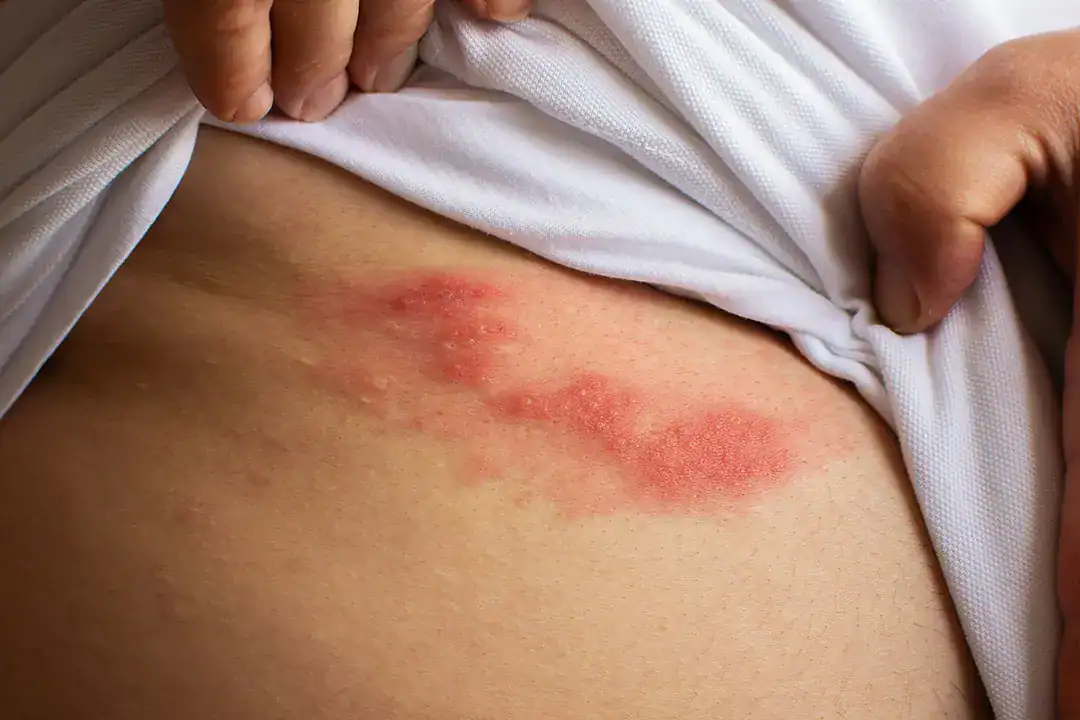Medical review by Danica Alexander, DO
Shingles can be scary and also puzzling. What exactly is this famously painful rash, who gets it, and why does it suddenly appear? Is shingles contagious? Who should be vaccinated? If you’re confused, you’re hardly the only one. Read on for answers to some of the most commonly asked questions about this viral infection. Some of them may surprise you.
What is shingles?
Shingles, aka herpes zoster, is a viral infection caused by the varicella zoster virus, the same virus that causes chickenpox. When you get shingles, the same viral particles that gave you chickenpox as a child become active again, this time causing different symptoms.
The main symptom of shingles is a painful, blistering rash that typically appears in a stripe on one side of your body, often on the face or torso.
How does shingles start?
For about a day or two before you see the rash, you may notice pain, burning or stinging in the area where it will appear. It’s sometimes described as an “electrical” sensation. Other early signs include:
- Sensitivity to light
- Headache
- Fever
- Chills
- Tiredness
- Upset stomach
Does shingles itch?
Some people experience mild to severe itching before the rash develops. Rarely, itching can persist for several months or even years after the rash goes away. The condition is known as postherpetic pruritus.
What does shingles look like?
At first, you’ll see reddish patches of skin with clusters of small, solid bumps. Tiny blisters appear 12 to 24 hours later. They get larger and cloudier and increase in number over the next two days. The blisters may converge into large blisters, which may rupture. After a rupture, the blister fluid forms a yellow-brown crust, and a scab forms underneath it.
Can shingles spread to other parts of the body?
The rash is usually confined to one area, but some people get it over a larger area of the body. Widespread shingles, known as disseminated shingles, usually affects people who have a compromised immune system.
How long does shingles pain last?
Shingles symptoms typically go away once the rash disappears completely, which takes 2 to 4 weeks, but pain may linger for another month or two. A relatively small percentage of people who get the rash—an estimated 10% to 18%—experience burning pain that lasts for months or years. The complication, called postherpetic neuralgia, can be managed but not cured.
Who gets shingles?
Anyone who has had chickenpox can get shingles, including children, but it’s most common in people over 50 due to the natural decline in immunity that occurs with age. Other risk factors include:
- Having an acute or chronic illness
- Having a disease that weakens the immune system, such as HIV/AIDS, leukemia or lymphoma
- Taking a medication that suppresses the immune system
- Undergoing radiation treatment or chemotherapy
Can you get shingles if you’ve never had chickenpox?
You can’t get it if you’ve never had chickenpox. If you come in contact with the fluid from shingles blisters, it’s possible you can get the chickenpox if you’ve never had it.
Can stress cause shingles?
Some studies suggest that experiencing chronic, daily emotional stress could make you more vulnerable, as could experiencing a stressful event such as a job loss or the death of a loved one.
Is shingles contagious?
If you have shingles, you can’t give it to another person. However, you can pass on the virus to someone who’s never had chickenpox or gotten the chickenpox vaccine, and they can develop chickenpox.
When is shingles contagious? Transmission of the varicella zoster virus is most likely to happen when you have open sores. You’re no longer considered contagious once the blisters scab over.
Can you get shingles more than once?
Most people get it only once, but it’s possible to get it again, especially if you have a weakened immune system.
Is shingles dangerous?
Shingles can lead to serious complications, such as postherpetic neuralgia and bacterial skin infections. If the outbreak occurs in a facial nerve near the ear, you could develop Ramsay Hunt syndrome, which can cause facial paralysis and deafness. It’s also possible to develop scarring and vision loss if the rash occurs in or around your eye.
Fortunately, you can lower your risk of complications—and speed healing—if you see your doctor as soon as symptoms start and take an antiviral medication such as acyclovir (Zovirax) or valacyclovir (Valtrex).
Can you die from shingles?
Death from shingles is very uncommon. According to the Centers for Disease Control and Prevention (CDC), fewer than 100 people die from it each year. Almost all are older adults or people with compromised immune systems.
Who can get the shingles vaccine?
The vaccine, Shingrix, is recommended for adults ages 50 and older and for people ages 18 and older who are immunocompromised.
Experts recommend that everyone who is eligible get vaccinated. That includes people who have already had shingles, have gotten the chickenpox vaccine or have gotten the Zostavax shingles vaccine, which is less effective and no longer in use. Be prepared for temporary side effects.
If you’ve never had chickenpox, ask your doctor if you should get the chickenpox vaccine instead.
Does Medicare pay for the shingles shot?
You can get Shingrix at your doctor’s office or local pharmacy. If you have Medicare Part D coverage, the shot will cost you nothing. Medicaid may or may not cover it, so check with your insurer.
Most private insurers also cover the vaccine but check before you make an appointment because there may be some out-of-pocket cost. If you can’t afford to get Shingrix, contact the vaccine manufacturer, GSK, to see if you qualify for financial support.
How often do you need to get the shingles vaccine?
You need to be vaccinated with Shingrix only once in your life. You’ll get the vaccine in two doses, with the second shot given 2 to 6 months after the first. If you’re immunosuppressed, it may be beneficial to get the second dose sooner. Your doctor should advise you on the timing.
Can you still get shingles after the vaccine?
While Shingrix is highly effective, there is a small chance you could still get the infection. If you do, it will be milder and shorter, and you’ll be less likely to experience complications.
Written by Jessica Brown, a health and science writer/editor based in Nanuet, New York. She has written for Prevention magazine, jnj.com, BCRF.org, and many other outlets.

